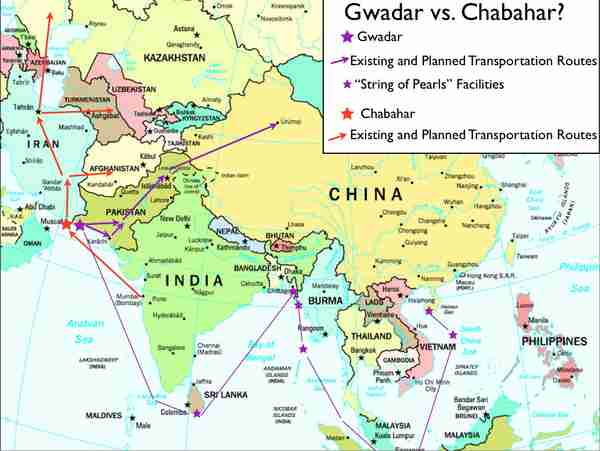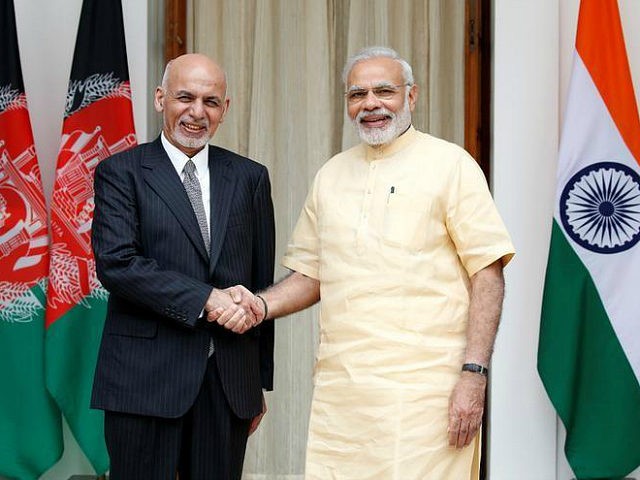This morning’s key headlines from GenerationalDynamics.com
- India begins shipping wheat to Afghanistan through Iran’s Chabahar port
- In retaliation, Afghanistan bans entry of Pakistan trucks
- Afghanistan-Pakistan Transit Trade Agreement (APTTA) – conduit of smuggling
India begins shipping wheat to Afghanistan through Iran’s Chabahar port

Map displaying the trade routes related to the Chabahar and Gwadar ports. Purple lines show China’s trade routes through Gwadar, while red lines show India’s planned trade routes through Chabahar. (Defence.pk)
A long-awaited “historic” first occurred on Sunday, when India shipped its first consignment of wheat to Afghanistan through Iran’s Chabahar port. The shipment travels by sea from Mumbai, India, to Chabahar, and then overland through Iran to Afghanistan.
The agreement for India to invest $500 million to increase the size of the Chabahar port was signed in Tehran in May of last year, in a signing ceremony attended by the leaders of Iran, Afghanistan, and India. Sunday’s shipment was more symbolic than otherwise, since the port will take at least another year to be fully functional.
The shortest overland route from India to Afghanistan is, of course, through Pakistan, but in December 2015 Pakistan decreed that Indian trucks would no longer be permitted to travel overland to Afghanistan. Pakistan required India to follow a complex route shipping goods by sea to Karachi, where they would be loaded onto Pakistani trucks for overland delivery to Afghanistan.
The Chabahar is also being developed in competition to Pakistan’s Gwadar port, which is receiving heavy investment from China as part of the China-Pakistan Economic Corridor (CPEC). The purple lines in the map above show China’s traditional trade routes across the sea, using China’s “String of Pearls” port facilities (purple stars), while the red lines show the trade routes being planned using Iran’s Chabahar port.
India and Pakistan, of course, have very poor relations. India is very concerned about China’s heavy investment in Pakistan in the CPEC program. In return, Pakistan is very concerned about the fact that India is also investing heavily in Afghanistan’s infrastructure, building on the relationship between Afghanistan and India at Pakistan’s expense.
As regular readers are aware, Generational Dynamics predicts that in the approaching Clash of Civilizations world war, the “axis” of China, Pakistan and the Sunni Muslim countries will be pitted against the “allies,” the US, India, Russia, and Iran. Pakistan Today and Pajhwok (Afghanistan) and The Hindu and Livemint (India, 10-Dec-2015)
In retaliation, Afghanistan bans entry of Pakistan trucks
Much of the competition between the Chabahar and Gwadar ports is related to strategic military planning in anticipation of the coming war between India and Pakistan, but a lot of it also has the more prosaic objective of providing jobs for truck drivers.
Pakistan’s December 2015 decree forbidding Indian trucks from traveling overland through Pakistan to Afghanistan had the effect of causing Indian truck drivers to lose jobs and Pakistani truck drivers to gain jobs, since shipments from India had to come through Pakistan’s Karachi port, and there loaded onto Pakistani trucks for overland delivery into Afghanistan.
In addition, in recent years, Afghanistan trucks have not been allowed to enter Pakistan, although at one time they were permitted to carry goods overland to either the port of Karachi or to the border with India.
On Sunday, Afghanistan’s president Ashraf Ghani issued a decree forbidding Pakistani trucks from entering Afghanistan. According to Afghanistan’s transport ministry:
The Afghanistan and Pakistan Trade Agreement (APTA) has expired. Before this Pakistan did now allow Afghan trucks to enter its territory. So we do the same and after this, Pakistani trucks will be unloaded at borders and Afghan trucks will carry the goods to Hairatan and Shir Khan ports.
Afghanistan trucking company execs were delighted. One said, “By this move, lots of people will get job opportunities and the transit companies will also get work.” Another said, “Pakistani trucks go to every part of our country, but our trucks are not allowed to enter Pakistan. We want the government to do the same to Pakistan.”
Apparently anticipating this decree, Pakistan has recently tried to head it off by offering to negotiate with India on the terms of a new transport deal. However, India turned down the offer, according to an Indian government official who said, “It wasn’t a real offer, as far as India sees it.” Tolo News (Afghanistan) and The Hindu
Afghanistan-Pakistan Transit Trade Agreement (APTTA) – conduit of smuggling
The Afghanistan-Pakistan Transit Trade Agreement (APTTA) was originally signed in 1950 and has undergone numerous changes over the years. The original purpose was to permit land-locked Afghanistan to import goods through Pakistan’s Karachi port, without the Pakistan authorities charging customs duties on the goods, since they simply passed through Pakistan. The agreement also allowed Afghanistan trucks to travel overland to India, though that is no longer permitted.
India has asked to be included as part of the APTTA agreement and to allow its trucks to deliver goods to Afghanistan through Pakistan. Pakistan has refused for several reasons, two of which have already been given: for strategic military reasons, and to prevent Indian truck drivers from taking jobs from Pakistani truck drivers.
However, there is a third reason having to do with smuggling and corruption.
There is evidence that something like 50 percent of the goods currently being imported under APTTA – such as cotton goods from China, or vegetable fats and oils from Indonesia and Malaysia – never reach Afghanistan. Instead, corrupt Customs Officials permit them to be unloaded within Pakistan for sale there, evading customs duties.
These foreign goods flood into Pakistan in competition with locally produced goods and the losses in customs duties from smuggling was estimated to be $35 billion from 2001-2009.
One figure estimates that APTTA accounts for 75 percent of an estimated $5 billion worth of smuggled goods entering Pakistan. Some other figures estimate that around 40 percent of transit goods do not cross the Pak-Afghan border, or they re-enter into Pakistan from Afghanistan. China envisions its trade to increase by more $1 trillion over a decade. Even a small percentage of that volume of trade smuggling into Pakistan would be crippling to its economy. Business Recorder (Pakistan) and Business Recorder
Related Articles
- Iran-India sign ‘historic’ Chabahar port deal to counter Pakistan-China (25-May-2016)
- China launches ‘One Belt One Road’, raising objections and violent protests (14-May-2017)
- Massive China-Pakistan CPEC energy project said to end energy crisis ‘soon’ (23-Mar-2017)
- Azerbaijan becomes the hub of the Caspian Trade Corridor, part of the new Silk Road (21-Jan-2016)
KEYS: Generational Dynamics, India, Iran, Pakistan, China, Chabahar, Gwadar, Afghanistan, Ashraf Ghani, Karachi, Caspian Corridor, New Silk Road, China-Pakistan Economic Corridor, CPEC, Afghanistan-Pakistan Transit Trade Agreement, APTTA
Permanent web link to this article
Receive daily World View columns by e-mail

COMMENTS
Please let us know if you're having issues with commenting.